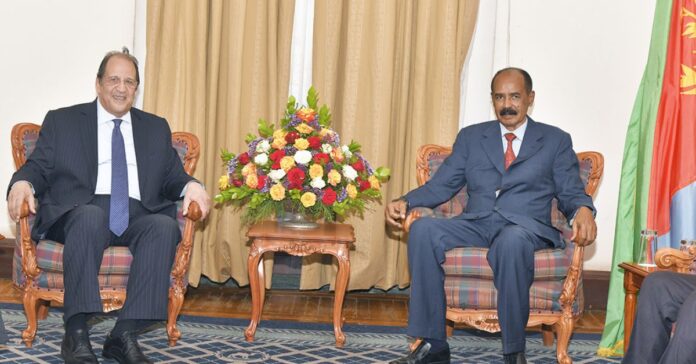President Isaias Afwerki met with a high-level Egyptian delegation, led by Foreign Minister Dr. Badr Abdelatty, at Denden Guest House in Asmara today. The meeting is part of ongoing periodic Consultative Forums held between the two nations in both Asmara and Cairo, aimed at addressing critical bilateral and regional issues. This session particularly focused on the evolving situations in Sudan, Somalia, and the security dynamics of the Red Sea region, according to government sources.
During the discussions, both sides emphasized that strengthening Eritrean-Egyptian bilateral ties is vital for promoting regional peace and stability. They agreed to enhance cooperation in various sectors, including economics, politics, trade, agriculture, energy, and health. This partnership reflects a shared commitment to addressing regional challenges and fostering stability in the Horn of Africa.
The talks occurred against a backdrop of escalating tensions in the Horn of Africa, including Ethiopia’s controversial Memorandum of Understanding (MoU) with Somaliland and the ongoing situation in Somalia. Ethiopia’s pursuit of a sea outlet through Somaliland has sparked a diplomatic crisis with Somalia, raising concerns about the potential impact on regional stability. Somalia views Ethiopia’s engagement with Somaliland as a violation of its sovereignty, complicating peace efforts in the region.
Officials from both sides reiterated Egypt’s position on regional stability, emphasizing that Egypt does not support any agenda of regional destabilization or interference. This clarification comes amid growing tensions and recent increases in Egypt’s military presence in Somalia, which have sparked concerns about a potential proxy conflict between Egypt and Ethiopia. The Eritrean government stressed that accusations against Egypt’s role in the region are unfounded, claiming they serve only to justify strategic errors made by other actors.
President Isaias Afwerki’s stance on regional cooperation, as articulated following his participation in the 9th China-Africa Cooperation Heads of State Meeting in Beijing, provides further context for these discussions. He underscored that “no African country can develop in isolation,” highlighting the necessity of regional integration and cooperation to address common challenges. Afwerki also criticized the ineffectiveness of regional bodies like the African Union (AU) and the Intergovernmental Authority on Development (IGAD), suggesting that African nations must adopt a more collaborative approach for true progress.
Both Eritrea and Egypt agreed to deepen cooperation across various sectors, reinforcing their strategic partnership. This enhanced collaboration aligns with Afwerki’s earlier emphasis on the need for African countries to address their internal issues before engaging in meaningful external partnerships. The Eritrean-Egyptian partnership aims to contribute to regional peace and reflects a concerted effort to promote dialogue and stability in the Horn of Africa.
The meeting underscores the complexities of the current regional landscape, where efforts to stabilize Somalia are compounded by Ethiopia’s pursuit of its geopolitical interests. The reinforced partnership between Eritrea and Egypt could act as a counterbalance to these developments, advocating for collective stability in the region. Afwerki’s message during the China-Africa summit—that Africa must focus on internal stability and regional cooperation before seeking external partnerships—reinforces Eritrea’s current diplomatic approach.
The upcoming months will be crucial as regional actors navigate these challenges, and the success of these efforts will depend on prioritizing collective stability over individual ambitions. Eritrean government sources indicate that the partnership with Egypt is pivotal in this pursuit, providing a framework for addressing the Horn of Africa’s multifaceted issues.

